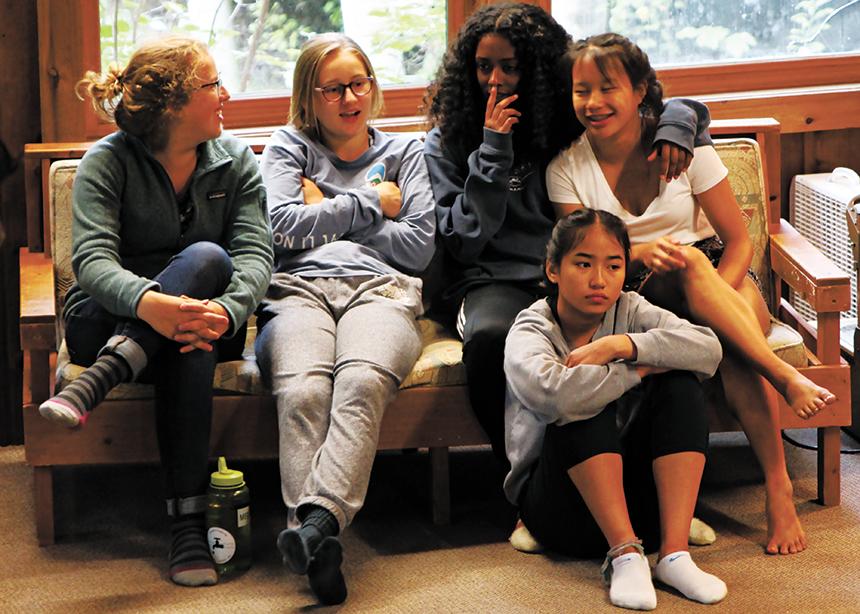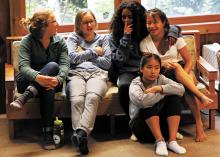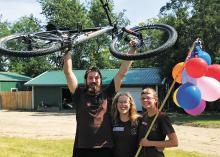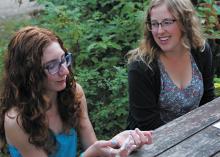It’s 10:30 on a sunny August morning and the lodge at Camp Koinonia, near Boissevain, Man., is bursting with shouts and harmonies. People dance and laugh together. The group radiates energy.
If the church is the body, then camp is the heart that pumps life into every corner.
I spent a week this summer volunteering at Koinonia, one of two camps that now make up Camps with Meaning, Mennonite Church Manitoba’s camping ministry. I was a cabin counsellor for youth week, a program for campers who have finished grades 9 to 12. Simply put, it was the best week of my summer.
I’m no stranger to camp, though. I worked at all three of Camps with Meaning’s locations—Koinonia, Assiniboia, and Moose Lake (before it was sold in 2017)—for five years and was a camper for seven years before that.
But when I returned after three years of being away, the profound reality announced itself loudly in my ear: Camp is an essential part of the church.
In a time when young people often feel disconnected from the church and are leaving in droves, camp is a space for both campers and staff to explore and strengthen their faith. Camp makes church come alive. We walked through the forest, torches casting flickering shadows and worship songs floating up into the night sky. Countless campers stayed around the fire after evening worship to talk about faith and life with camp staff.
Every morning before the campers woke up, staff gathered for prayer, hot coffee set down and hands held, sharing their hopes for the day. I’ve lost count of the number of times I’ve heard staff say that camp is the reason they are still part of the church. At camp, in creation, God feels present.
I was also reminded that the camp community is a living, breathing, stumbling embodiment of Jesus’ love. In this place, everyone is free and encouraged to be their true, unique selves. That doesn’t mean everyone is always awesome. Staff are exhausted, campers clash and tempers can fray. But there is also love, support and celebration. Whether they are at their best, their worst or something in between, the people at camp are at their “realest.”
But while my heart beats for camping ministry, I fear for its future. Camps with Meaning’s camper numbers are steadily decreasing.
Why aren’t more people sending their kids to camp and supporting it? Other camps are struggling, too, and are noticing trends:
- Parents are increasingly sending their children to sports or music camps because they want them to gain quantifiable skills to prepare them for their futures. Or they’re afraid of not seeing their children for a week, so they’re signing them up for day camps.
- And youth are prioritizing making money and getting experience for careers.
But the people that camp moulds and creates are people who are integral to not only the church’s future, but the world’s.
Camp provides opportunities for staff, and campers who eventually become staff, to develop crucial leadership skills. From preparing supplies and planning a 60-person canoe trip, to sitting up all night with a homesick camper, taking a trip to the hospital for a broken ankle or cleaning up some pretty gross messes, camp isn’t always happy or fun. There are difficult times, but every year staff grow and strengthen in their ability to deal with the challenges.
The vast majority of camping programs happen outside and there is no internet access, and in Koinonia’s case, no phone service either. In a world lived online and inside, camp offers a radically countercultural reality: face-to-face interactions, community, teamwork and creation care.
And lots of memories:
- People plunging waist deep in squishy mud at the end of a portage on the canoe trip, screaming and cheering.
- Campers chanting each other’s names in encouragement when they found it hard to keep going during a two-hour hike at the end of a long day.
- Learning to swing dance first thing in the morning.
- Staying up all night and having difficulty breathing because of tear-inducing, belly-aching laughter.
Through all the overwhelmingly tough situations and frequent outbursts of joy, camp is a place of goodness, a community that is impossible to replicate in quite the same way. I hope and pray this ministry can continue to shine its unique light into the world for a long time to come.







Add new comment
Canadian Mennonite invites comments and encourages constructive discussion about our content. Actual full names (first and last) are required. Comments are moderated and may be edited. They will not appear online until approved and will be posted during business hours. Some comments may be reproduced in print.